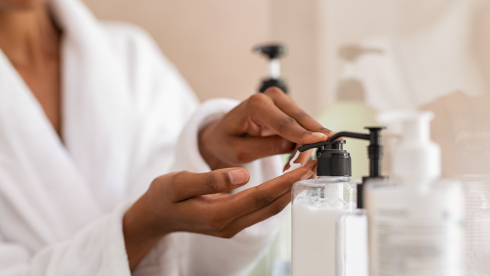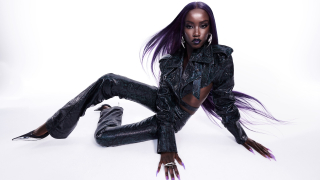7:30am, Pacific Time. Kenya Barris pulls into the parking lot of the Hollywood office where he creates comedic magic for his hit sitcom, Black-ish, which premiered its second season last night. Executive producer and co-showrunner Barris promotes the show by taking calls from press, placing them on hold, clicking to the second line, and returning to answer more questions. He’s verbal. Funny. Black college educated (Clark-Atlanta). And like most parents, enjoys talking about his children.
“I’ll be with my kids on the weekends and my two middle daughters,” he says. “I heard rumbling upstairs and I’m like, ‘What’s going on?’ I let it go on for a while. And finally I couldn’t take it anymore. I go upstairs and they had my sons in their karate gees with full head gear on,” he says, giggling. “And they were having a fight club upstairs, fighting each other for bets. And I felt I had to do this. So in some effort, I do find a lot from my family.”
Barris is the foundation of who and what you see when tuning into Black-ish. Raised in Compton, he found creative and financial success when partnering with childhood friend Tyra Banks to create America’s Next Top Model. Its international success led to him becoming a writer for numerous projects, including The Game and Are We There Yet? He married a doctor named Rainbow (same as Tracee Ellis Ross’s character on Black-ish). And like his characters Rainbow and Andre Johnson (Anthony Anderson), Barris raises children while struggling to maintain his blackness in a world of upper class, White neighborhood living.
“Because they’re growing up in a different environment than I did, it’s easy for them to fall out of the idea that ‘I’m Black in America,’ ” says Barris, whose new season of Black-ish includes storylines on the N-word and guns. “But every now and then, it rears its head up to them. And they’re like, ‘What? Why did this happen?’ And I’m like, ‘You know why that happened?’ And I hate to be that guy. But I just try to make sure they’re aware and careful, especially my sons.”
It’s this complicated world where Barris pulls his laughs to create a family show motivated by an upbringing watching and loving The Cosby Show. “But I don’t think I ever remember Bill [Cosby] referencing or talking about the fact that his family was Black,” says the 41-year-old. “They were clearly Black, and he wasn’t running from that. But I don’t think it was really part of what the DNA of the show was. And for me, that was something I wanted to do. Especially with this time period. We have a Black president and all these things. Why not not run from it? But at the same time, embrace what that is like.”
The result is a sitcom that successfully teeters along the line of being both funny and educational, addressing social ills influenced by race relations. “I kind of consider myself a derivative of Norman Lear, who is a huge part of the writer I am today. And a huge part of a lot of Black people my age or younger, whether they know it or not,” says Barris, referring to the legendary writer and producer of Good Times, The Jeffersons, Sanford and Son and All in the Family.
“[Norman Lear] really was a person of his time who was doing comedy that was about something. Topical comedy. And I think that has become a lost art form. And that’s what we try to do. We don’t do it every week. But it’s difficult. And I understand why more comedies don’t do it. It’s hard enough to do ‘my boss is coming over and my wife made the pot roast’ comedy. But it’s harder to do ‘I’m worried about my little brother being shot’ comedy.
“I feel like we need to have a more honest look at the world we live in. I used to look at Friends and Seinfeld and wonder, ‘What part of New York is that? There’s no Black people? I never been to that part of New York.’ I feel like you don’t have to placate my people by forcing something in that doesn’t exist. But don’t take us out where we do. Don’t not tell our stories. Don’t keep us out of the light of this American society we live in because of some arbitrary reason. Give us a shot.”
The irony is that Barris’s audience of Black-ish is 80% White. The result is a press campaign to push for more Black viewers. The challenge is that his show airs during the timeslot for Fox’s Empire, and at the same time as NBC’s newest Black family sitcom, The Carmichael Show (recently picked up for a full season).
“All the Black shows come on Wednesday at nine o’clock,” he says, laughing cryptically. “It’s crazy. Jerrod [Carmichael] is a really good friend of mine. And so are the people who did Empire. I support all of them. They talked about moving us, but we stayed at 9:30.”
Regardless of the audience Barris might want, Black-ish is a critical and certified hit, being last season’s top- rated new comedy for adults 18-49. Today, he touts a multiyear deal with ABC. He’s also writing the upcoming film version of the TV show Good Times. And he keeps a hopeful eye on the future, while predicting what’s next for Black family TV.
“I would think one of the big things is going to be more honest storytelling. I think that’s where we’re at right now. I think there may be Black family shows with LGBT parents. Two gay parents. I think the idea of Black family may not be what it was 10-20 years ago or five years from now. It may be a mixed homogenized version of that,” he says.
“Right now, I’d like to see my show on in the future. That’s where my head is at as I pull in at work at 7:30 every day. I think if I were to speak it into my destiny, I would love to have a comedic version of what Shonda Rhimes has. Having a family of comedy and opening doors for new voices; I think that would be something I would love to be a part of.”
Raqiyah Mays is an author, journalist, radio personality, and activist. Her debut fiction novel The Man Curse will be released by Simon & Schuster on November 16, 2015.













